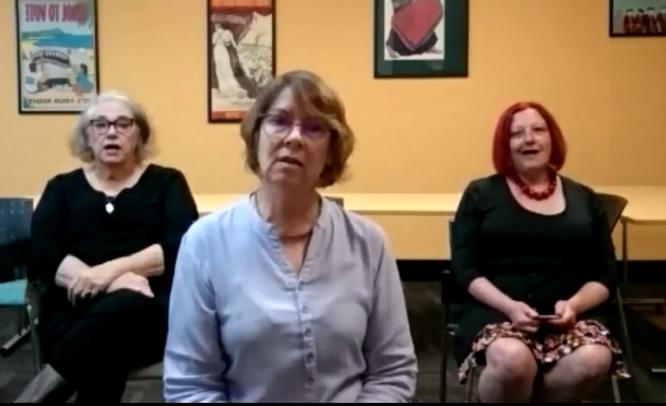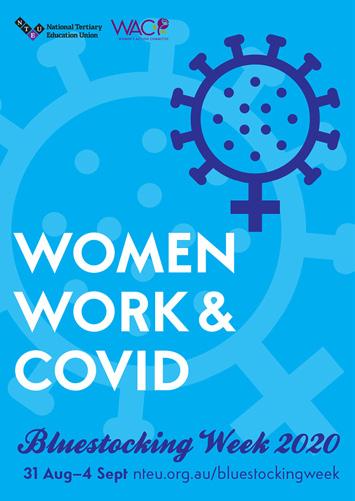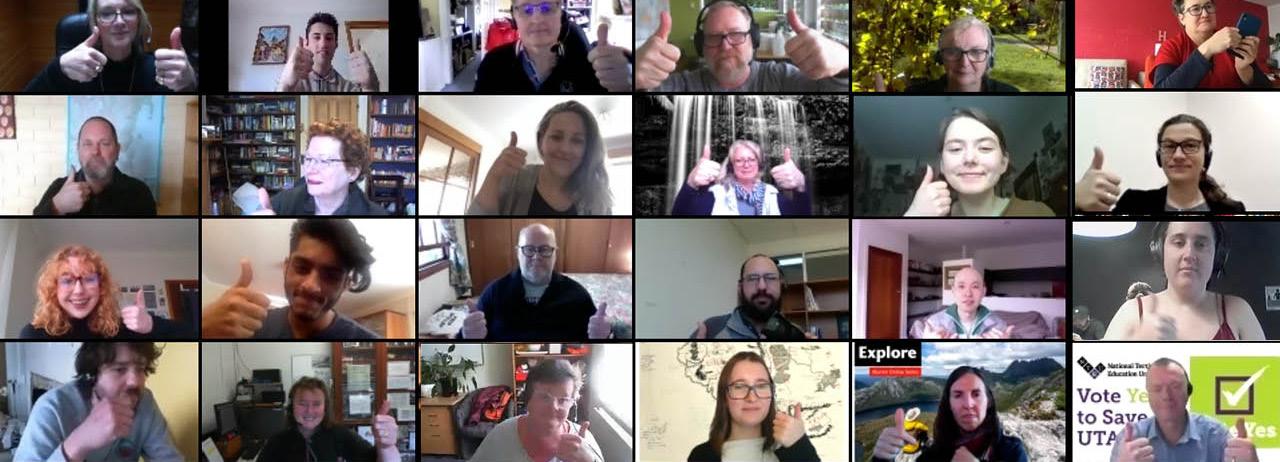
9 minute read
Women’s Action Committee (WAC
from NTEU Annual Report 2019-2020
by NTEU

www.nteu.org.au/women
Advertisement
WAC 2019–20
Chair Alison Barnes A&TSIPC Rep Anna Strzelecki UniSA Division Representatives
ACT NSW NT Qld SA Tas Vic WA General: General: General: General: General: General: General: General: Jo Washington-King UC Julia McConnochie UTS Sylvia Klonaris CDU Gwen Amankwah-Toa QUT Cécile Dutreix UniSA Jenny Smith UTAS Karen Lamb ACU Corinna Worth Curtin
Staff Support
National Office Terri MacDonald NSW Rhianna Keen SA Juliet Fuller,Cheryl Baldwin Vic Amelia Sully
Image (this page): From lockdown in Melbourne, National President Alison Barnes Zoomed into the NT Division’s Bluestocking Week live seminar hosted by Sylvia Klonaris; Kerrie Mellick (JCU) and Leah Winslow (GU) participating in the Anna Stewart Memorial project. Image (opposite page): Cheryl Baldwin, Cécile Dutreix, Juliet Fuller and Jess Jacobson at the University of Adelaide during Bluestocking Week. 16 Academic: Academic: Academic: Academic: Academic: Academic: Academic: Academic: Blair Williams ANU vacant Amanda Brain CDU Leonie Barnett CQU Katie Barclay Adelaide Natalia Nikolova UTAS Virginia Mansel Lees LTU Suzanne Jenkins UNDA
Qld Tas WA Noeline Rudland Emma Gill Donna Shepherdson Due to COVID-19 closing down the National Office in March 2020, faceto-face meetings of the Women’s Action Committee (WAC) were replaced by two online meetings, which occurred in April and July. The focus of these meetings centred primarily around the growing impact of the COVID-19 crisis on our universities, and the feminised nature of the mass job losses that have ensued. However, the NTEU proceeded with our annual Bluestocking Week, and the promotion of our women’s organising networks in supporting our national campaigns on opposing job cuts and the Federal Government’s plans to cut funding to higher education.
Key activities • Monitoring gender equity legislation and progress in the sector. • Ensuring that gender balance, equity and advancement of women are integral to all
NTEU structures, policies and practices. • Coordinating the annual Bluestocking
Week event. • Contributing feminist critique to Aboriginal and Torres Strait Islander, industrial and higher education policy and research analysis, materials and campaigns. • Participating in trade union women’s activities. • Engaging with and, where relevant, supporting research projects, conferences
and publications of interest to women in the Union. • Producing the women’s publication Agenda. Women and COVID-19 at universities Women now make up around 58% of university staff and consequently experience high levels of insecure employment; according to Universities Australia, women are 1.5 times more likely to be in insecure jobs in the university workforce. NTEU has projected around 30,000 higher education jobs to be at risk as a result of both the COVID-19 crisis and the refusal of the Federal Government to assist in any meaningful way. In tracking the various announcements by higher education providers, we know that the majority of jobs that were initially lost were those held by casual/sessional academics, lower level professional/general staff and researchers on rolling contracts. More recently, however, permanent academic staff and more senior professional/general staff are being targeted. Many of these permanent jobs, particularly in academia, are likely to be replaced by staff at lower levels and on casual/short term contracts. Unfortunately, the recently passed Jobs-Ready Graduate package will not save one single job or provide the sector with additional ongoing funding, despite a projected loss of $16 billion in the next 3 years due to COVID-19. Instead, the Government’s changes will require universities to teach more students for less funding per student overall, increase the financial burden on students and intensify the already high levels of insecure employment. While workload pressures have temporarily increased as a result of the COVID-19 crisis, there is a real concern that, for the staff who keep their jobs following the redundancy rounds, universities will seek to implement ways of extracting more labour, for less. The next rounds of bargaining will be crucial in preserving hard won rights and entitlements, particularly around workloads. While women are at the forefront of university job losses, the COVID-19 fallout has also resulted in decreased research and

publication opportunities, tensions around work-life balance and carer obligations (noting that the home schooling during COVID-19 has fallen primarily to women) as well as obstacles to career progression. There have been reports that women from diverse backgrounds are facing additional barriers to entry, retention, and progression, particularly in STEM areas, as a result of COVID-19. There is evidence that some university managements are winding back equity programs that promote workforce diversity. We know from broader research that women are also bearing the brunt of other COVID-19 related stress, mental health problems and physical and emotional violence. The Union views domestic and family violence as a workplace issue, noting this violence does not stop once the victim leaves home. However, in an environment where the target of the violence is working from home, the risk to that person from their perpetrator increases dramatically. Finally, the COVID-19 crisis has presented many managers in universities with an opportunity to attempt widespread industrial relations changes. This may in the long-term result in wider restructures, less protections around redundancies, and increased casualisation through ‘flexible employment’ models. Union experience is that these practices disproportionally impact women.
Bluestocking Week The impact of COVID-19 on women in higher education, framed around the theme Women, Work & COVID-19, set the tone for this year’s Bluestocking Week (31 August–4 September), now in its 8th consecutive year. While the higher education sector is in crisis, the high level of insecure employment and the inequalities that women in particular experience were present long before the COVID-19 pandemic hit. While noting the mass redundancies, a growing gender pay gap, insecure work, and an antagonistic Federal Government, Bluestocking Week 2020 focused both on elevating the achievements of women in higher education as well as encouraging members to work together to build a better working life on the other side of the crisis. Despite the limitations presented, Branches and Divisions still held Bluestocking Week events, with petitions, songs, discussions and cupcakes. The culmination of Bluestocking Week was a national seminar on Women, Work & COVID-19 that was attended by over 300 members via Zoom. NTEU National President, Alison Barnes, set the context and introduced the two special guest speakers, Professor Rae Cooper (Gender, Work and Employment Relations and Co-Director of the Women, Work & Leadership Research Group) and Sarah Mosseri (Postdoctoral Research Associate in Work and Organisational Studies). Both spoke about the disproportionate impact of the pandemic on women and the widening of the economic gap between men and women.
Participation of women in the university workforce The latest Department of Education data (2019) shows that there are 61,691 Full Time Equivalent (FTE) women university staff, making up 57% of all university staff. While the Departmental data does not include casuals, it is worth noting the proportion of women in difference areas and levels:
• Teaching only: 59% women • Research only: 46% women • Teaching and research: 44% women • Other function (non academic): 65% women. While higher education is feminised, the more senior the level, the greater the proportion of men: • Above senior lecturer: 25% women. • Level C: 45% women. • Level B: 53% women. • Level A: 51% women (however, this is likely to be an under estimation as casual/ sessional staff are usually appointed at level A, and are not included in the
Government’s FTE data on levels).


Images (this page): NTEU Industrial Officer, Noeline Rudland, Retired NTEU Griffith member and Emma Miller Award recipient, Sue Monk, and USQ Organiser, Patsy O’Brien starting the Qld Bluestocking Week meeting with a rendition of ‘Bread & Roses’; From lockdown in Melbourne, National President Alison Barnes Zoomed into the CDU Bluestocking Week live seminar hosted by Sylvia Klonaris; Former federal ALP MP for Longman, former official with the United Workers’ Union, and now Vice-Chancellor’s Fellow at QUT, Susan Lamb, spoke at the Qld Bluestocking Week event on why ‘Politics Matters’, how unionism and politics has improved the lot of women workers in Australia; Bluestocking Week 2020 poster. 18 While the Department does not collect data on levels in non-academic areas, the NTEU’s own data as well as reporting by the Workplace Gender Equity Agency has shown that the proportion of men increase substantially at managerial and senior managerial level.
Participation of women in the Union Over the last 19 years there has been a steady increase in the number of women NTEU members. In 2000, women comprised 48% of the Union’s membership, but this has now grown to 59% in 2020 (up from 58% in 2019), which is a slightly higher proportion than the sector overall. The largest group of NTEU members are women academics at 10,217 (up from 8,793 in 2019), which comprise 56% of the Union’s women membership and 33% of all members.
In relation to casual members, women are also the majority at 58% (proportionally unchanged from 2019), which is consistent with the overall trend. As with the data for all members, the majority of casual members are women academics, comprising 46% of all casual members. However, a difference with casual membership compared to overall membership is that academic casual women make up 80% of all casual women members.
There are relatively fewer casual general staff women (and men) taking NTEU membership than overall but interestingly, casual women comprise 58% of all casual general staff members, while for general staff members overall, the proportion of women is higher at 66%. While this difference may be a reflection on the type of work being undertaken by general staff members who are insecurely employed, the NTEU should review our recruitment strategies that target general and professional staff, particularly for casual/ contract staff.

Elected Union officials Below are the current numbers of elected officials. It’s worth nothing that while women are in the majority as ‘Branch officials’, they fill less than half of the important roles including National and Division Councils and as Branch Presidents. The Union may wish to review strategies around mentoring and support for women in Union leadership roles. The WAC has been involved in previous programs to encourage women within the NTEU to take on activist and leadership positions, and would welcome the opportunity to continue this work with Divisions and Branches.
Position National Executive National Councillors Division Councils Branch Presidents Branch Officials* Women 10 46 73 12 213 Men 12 59 89 25 186
*Excludes Branch Presidents and National and Division Council members, includes Sub-Branches.
Looking to the Future This year has presented the Union and the WAC with many challenges and obstacles, yet we have continued to grow both in our organising strength and in membership numbers. The WAC is looking forward to using this momentum to build on our advocacy work and fight for the issues that are important to women in our Union. ◆










